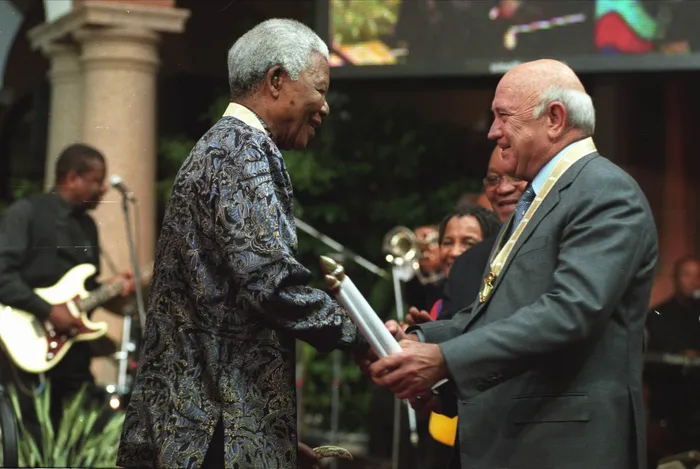Consensus building is the future of multiparty democracy

President Nelson Mandela, right, and Second Deputy President FW de Klerk. The transition from apartheid to democracy in the early 1990s is one of the most notable examples of consensus building, say the writers. – Picture: Alf Kumalo / African News Agency (ANA)
By Paul Kariuki and Adebimpe Esther Ofusori
Consensus building is a crucial process in multiparty political systems, particularly in a diverse and complex society like South Africa.
It is a complex and dynamic process influenced by the country’s historical, social and political contexts. It is a conflict-resolution process used mainly to settle complex, multiparty disputes which guarantees that all parties’ interests are protected.
This is possible because participants make final decisions themselves and each party has a chance to make sure their interests are represented and are part of signing off on the agreement.
In South Africa, consensus building has a historical background determined through the theory of declaration, will and reliance.
Consensus building is important in society because many problems affect diverse groups of people with different interests. As the problems increase, the organisations and parties that deal with them are affected by decisions and rely on one another for help.
It is, therefore difficult, and often ineffective for organisations to try to solve controversial problems on their own. Consensus building offers a way for individual citizens and organisations to collaborate on solving complex problems in ways that are acceptable to all.
Consensus building in South Africa has been a significant aspect of the country’s political and social landscape, particularly in its transition from apartheid to a democratic society.
Given its diverse population and history of apartheid, consensus building is essential for maintaining social cohesion and democratic stability.
The transition from apartheid to democracy in the early 1990s is one of the most notable examples of consensus building. Key figures like Nelson Mandela and FW de Klerk engaged in negotiations to dismantle apartheid and establish a new democratic framework. The efforts culminated in the 1994 democratic elections.
The Truth and Reconciliation Commission (TRC), established in 1995, is one of the institutions aimed at addressing the human rights violations that occurred during apartheid.
The TRC emphasised restorative justice and aimed at building a national consensus on the need for reconciliation.
Nedlac, formed in 1995, is another platform where the government, business, labour and community organisations negotiate and reach consensus on social and economic policy issues. It plays a crucial role in shaping labour laws, economic policies and social initiatives.
The negotiation process that led to the adoption of South Africa’s 1996 Constitution involved a broad range of stakeholders, including political parties, civil society and interest groups. The inclusive nature of the negotiations helped build a broad consensus on the principles of the new democratic state.
Despite the efforts of the institutions, several factors influence consensus building, each with implications for multipartyism in South Africa. Some of them are:
- Political culture and history:
- Reconciliation and nation-building efforts:
- Ethnic and racial diversity:
- Socio-economic inequality:
- Electoral system:
- Parliamentary procedures:
- Leadership styles:
- Political will:
- Active civil society:
- Role of the media:
- Economic stability:
- Resource allocation:
The implications of consensus building on multipartyism are:
- Coalition governments:
- Policy formulation and implementation:
- Political stability:
- Democratic consolidation:
- Public trust and engagement:
- Social cohesion:
In conclusion, consensus building in South Africa is a process that requires continuous effort from all sectors of society. It is essential for addressing the country’s complex social, economic and political challenges and fostering a stable and inclusive democracy.
Consensus building is also influenced by a complex interplay of historical, socio-economic, institutional and political factors.
Effective consensus building is essential for the stability and functionality of multipartyism, fostering democratic consolidation, public trust and social cohesion. By addressing the factors that hinder consensus and leveraging those that promote it, South Africa can strengthen its democratic processes and ensure more inclusive and effective governance.
* Dr Paul Kariuki is the executive director of the Democracy Development Programme and Dr Adebimpe Ofusori is a researcher. They both write in their personal capacities.
** The views expressed in this article are not necessarily the views of The African